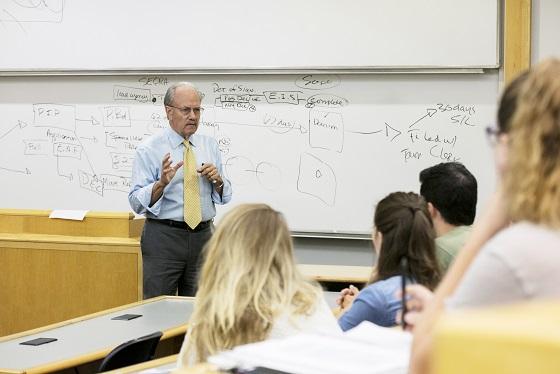Juris Doctor Program

More in Juris Doctor Program

The JD Program
Haub Law offers a full-time and part-time day academic program that provides solid preparation for students who wish to become lawyers. The program offers an integrated curriculum designed to ensure the development of appropriate academic, procedural, and lawyering skills.
Our Paths to Practice approach provides students with a roadmap for pursuing their particular interest in law. Earn an Advanced Certificate in Environmental Law or International Law or concentrate your studies in a number of legal fields including business law, criminal law or dispute resolution. Through two dozen clinical and externship opportunities, students work with real clients and get the skills they need to practice law and pursue a successful legal career.

Earn an Advanced Certificate or Dual Degree
JD candidates may structure their courses of study to attain Advanced Certificates in Environmental, International Law or Health Law and Policy as part of their law degrees.
Explore First Year Required Courses
Please see our Academic Advising webpage for a detailed breakdown of first-year required courses as well as upper-level requirements.
Learning Outcomes for the JD Program
Learning Outcomes for JD Students graduating from the Elisabeth Haub School of Law at Pace University
These Learning Outcomes represent the professional journey that a JD candidate undertakes in earning their degree at Pace. They reflect the knowledge, skills, and values that we impart and expect our students to acquire during their studies. Not every course in the JD curriculum reflects every learning outcome, but we expect the Haub experience as a whole to contain the following:
- Knowledge and understanding of substantive and procedural law
Students will be able to demonstrate understanding of the:
- Rules and policies of the fundamental areas of US substantive law, including civil procedure, constitutional law, contracts, criminal law, property, and torts, as well as subjects most frequently tested on the bar exams.
- Structures and processes of the US legal system, including the role of the lawyer within that system.
- Meanings of legal language and terminology.
- Role of case law, precedent, and statutory and regulatory law in our legal system.
- Rules of statutory construction.
- Advantages and disadvantages of various processes for resolving problems.
- Legal analysis and reasoning, legal research, problem-solving, and written and oral communication in the legal context
Students will be able to:
- Use legal doctrine to solve problems by:
- Identifying and articulating the legal issues in a factual scenario.
- Using cases, treatises, secondary materials and classroom studies to extract and synthesize legal rules and evaluate key rules, standards, and policies.
- Analyzing the hierarchy of legal authority and determining when a rule announced in a judicial opinion constitutes binding precedent, including the ability to distinguish “holdings” from “dicta.”
- Expressing the position of dissenting and concurring opinions.
- Reconciling conflicting authorities.
- Analogizing to and distinguishing from facts of relevant authorities.
- Drafting clear, effective, professional and well-organized objective and persuasive written documents.
- Delivering clear, effective, professional, and well organized oral argument.
- Apply statutory and regulatory law to solve client issues by:
- Interpreting statutes using rules of statutory construction.
- Applying statutory law in a creative way to further client goals.
- Correctly apply legal language and terminology.
- Conduct effective legal research, including:
- Creating an efficient and comprehensive research plan and implementing it.
- Using hard copy and digital resources to find, understand, and organize relevant authorities.
- Ensuring that cited law is current and applicable.
- Using proper citation format in all legal writing.
- Using librarians and professional staff to assist when needed.
- Understand the process of gathering facts, including:
- Forming hypotheses about relevant information.
- Identifying potential sources of such information
- Identifying missing information and creating a plan to gather it.
- Testing hypotheses through preliminary information gathering and, if necessary, forming new hypotheses and/or seeking additional information.
- Gathering information from legal and non-legal sources.
- Evaluating reliability and strategic significance of information in light of rules of evidence and other legal standards.
- Understand the basic requirements for drafting written legal documents, including
- Clear, accurate and precise use of language
- Significance of audience
- Organization
- Thoroughness
- Legal requirements
- Testing for litigation problems
- Understand the concepts and skills of effective client interviewing, including
- Building rapport and trust
- Gathering information
- Maximizing accurate fact gathering.
- Formalizing relationships
- Understand the basic principles and skills of effective client counseling, including:
- Identifying client objectives and priorities.
- Working with clients to identify possible alternatives and examine the pros and cons of each.
- Empowering the client to make decisions about goals and procedural options.
- Communicating clear, helpful, and accurate predictions
- Communicating clearly and effectively about the applicable law.
- Understand the basic principles and skills of effective negotiation, including:
- Determining the client’s objectives and possible solutions.
- Determining the objectives of the other side.
- Articulating the difference between positions and interests in a factual context.
- Applying listening skills to encourage dispute resolution.
- Strategically and ethically sharing information.
- Exercise of proper professional and ethical responsibilities to clients, officers of the courts, the legal system, and society, including the following: the exercise of professional judgment consistent with the values of the legal profession; knowledge, understanding and appreciation of the profession’s values of justice, equal access to justice, fairness, candor, honesty, integrity, professionalism, respect for diversity and the rule of law; recognizing and resolving ethical dilemmas; cross cultural competency; organization and management of legal work, including the appropriate use of technology; and collaboration in practice.
Students will be able to:
- Understand and conduct themselves according to the Rules of Professional Responsibility (and relevant state and local rules of practice), including
- Recognizing and addressing ethical dilemmas and the need for consultation, when necessary, with a supervisor or other appropriate mentor or authority.
- Identifying and describing the sources of law governing lawyers in the US legal system
- Identifying and describing and interpret the rules and policies governing lawyers in the US legal system.
- Articulate, and demonstrate the fundamental values of the profession, including
- Maintaining a commitment to pro bono and public service and otherwise promoting access to adequate legal services.
- Demonstrating the ability to conduct themselves with honesty, integrity, fairness, respect, empathy, civility, and cultural competence.
- Develop the ability to reflect and collaborate, including:
- Demonstrating self-awareness and reflective capacity, including learning from mistakes, recognizing biases, and actively working to counteract them in service of clients.
- Demonstrating the ability to collaborate with colleagues, work cooperatively toward shared goals, and treat conflicting viewpoints among colleagues as an opportunity for improving understanding and achieving goals.
- Understand the personal, economic, and professional pressures of legal practice and the basic principles of organization and management of legal work, including available technology.
